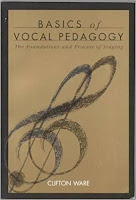In the last blog, I shared some ideas from So You Want to Sing Cabaret about how the role of the voice is to be in service to the text of the songs we are singing. This shifts our goal from making the most beautiful sounds possible to making the sounds that most appropriately express the lyrics.
In the book, authors David Sabella and Sue Matsuki also identify what they consider to be the main objective for technical voice study when it comes to singing cabaret: "...to enhance the singer's vocal ability and options safely and effectively, giving them a greater facility with which to complete the storytelling while at the same time never calling attention to that technical ability while performing." They provide an example of an inappropriate use of the voice if, for instance, a soft, intimate song is sung with a fully resonant vocal quality. In this case, as they say, "we are taken out of the story and confronted with a use of voice that tells us more about the singer's vocal training than the story being told."
They believe there are two primary reasons singers often make these choices. The first is that decades of pop and rock music has conditioned society's vocal performance tastes to a "higher, louder, longer" mentality. "Even in classical music," they say, "holding a note higher, louder, and longer—as if it were a test of endurance—is applauded." In these times, listeners are practically forced to pay attention to the skills of the singer rather than the meaning of the text.
A second reason singers make these technique-first performance choices, according to the authors, is that they feel they have to prove to everyone that they have a good voice or a solid technique. Sabella and Matsuki remind readers that, at the level of professional performance, we all assume that the singers onstage can, in fact, sing. They shouldn't need to prove that. As they write, this attitude sometimes has the opposite effect: "Very often it is the singer's own need to prove that they can sing that unfortunately backfires and results in highlighting a technical deficit, which might otherwise have gone unnoticed."
Now, maybe the goals of a performance within a university theatre department are different from a performance on a professional stage. Maybe, in this program, you feel like you have to put your vocal skills on display because that is how you believe you are being evaluated and graded. Naturally, one of the goals of vocal study is to build technique, which is something we hope to see in your performances. But, as we discussed in the last blog, the reason we build vocal technique is so that we have as wide a range of vocal colors as possible so that we are better equipped to express the full gamut of emotional states our characters experience. So we're not just looking for a demonstration of ability. We want to see how you use your technique to tell a compelling story.
As Sabella and Matsuki put it, "the singer must continue to work on the mastery of vocal technique to complete the vocal gesture without the anxiety of needing to prove their own merit."
We're all works in progress. None of us have an absolutely flawless technique. But when we get to performance time, it's no longer about building technique. It's about using our current capabilities to create dynamic characters. Coming into the final performances of the semester, you may entertain this question from So You Want to Sing Cabaret:
"Are you willing to trust that the vocal training you have had resides within you and does not need to be proven to your audience?"
Thanks for a wonderful semester. I'm grateful for all of you. Let's finish strong.
Now go practice.




















